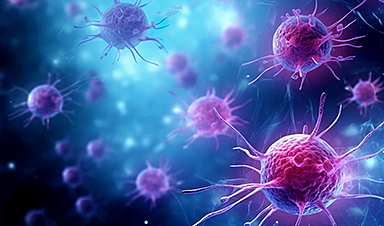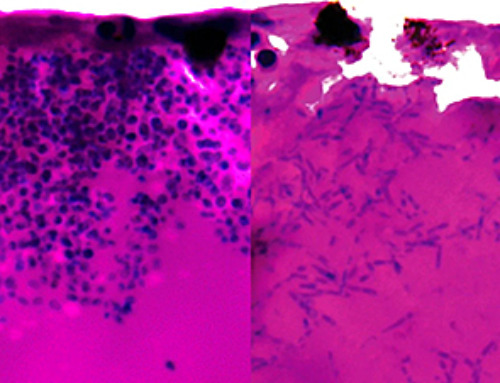Researchers discovered that ovarian tumors hinder T cells' energy supply by trapping a key protein, blocking lipid uptake. A new approach to reprogram T cells could enhance immunotherapy for aggressive cancers.
Researchers at Weill Cornell Medicine have uncovered a mechanism by which ovarian tumors weaken immune cells, effectively blocking their energy source and hindering their ability to launch an attack. Published on October 23 in Nature, this discovery offers a potential new immunotherapy strategy for ovarian cancer, a notoriously aggressive and challenging disease to treat.
A significant obstacle in treating ovarian cancer is the tumor microenvironment—the complex ecosystem of cells, molecules and blood vessels that shields cancer cells from the immune system. Within this hostile environment, T cells lose their ability to take up the lipid (fat) molecules, which are necessary for energy to mount an effective attack.
"T cells rely on lipids as fuel, burning them in their mitochondria to power their fight against pathogens and tumors," explained senior author, Dr. Juan Cubillos-Ruiz, The William J. Ledger, M.D., Distinguished Associate Professor of Infection and Immunology in Obstetrics and Gynecology at Weill Cornell Medicine. "However, the molecular mechanisms that govern this critical energy supply are still not well understood."
Identifying How Tumors Block T-Cell Energy Supply
Lipids are abundant in ovarian tumors, but T cells seem unable to utilize them in this environment. "Researchers have focused on a protein called fatty acid-binding protein 5, or FABP5, which facilitates lipid uptake, but its exact location within the T cell remained unclear," said Dr. Sung-Min Hwang, a postdoctoral associate in Dr. Cubillos-Ruiz's lab who led the new study. Dr. Hwang discovered that in patient-derived tumor specimens and mouse models of ovarian cancer, FABP5 becomes trapped inside the cytoplasm of T cells instead of moving to the cell surface, where it would normally help take up lipids from the surroundings.

"That was the 'aha!' moment; since FABP5 is not getting to the surface, it couldn't bring in the lipids necessary for energy production. But we still needed to figure out why," said Dr. Cubillos-Ruiz, who is also co-leader of the Cancer Biology Program in the Sandra and Edward Meyer Cancer Center at Weill Cornell Medicine.
Working with collaborators, the researchers used a battery of biochemical assays to identify proteins that bind to FABP5. They found a protein called Transgelin 2 that interacts with FABP5 and helps move it to the cell surface.
Further experiments revealed that ovarian tumors suppress the production of Transgelin 2 in infiltrating T cells. Delving deeper, the researchers discovered that the transcription factor XBP1, which is activated by the stressful conditions within the tumor, represses the gene encoding Transgelin 2. Without Transgelin 2, FABP5 is trapped in the cytoplasm of T cells, preventing lipid uptake and rendering the T cells unable to attack the tumor.
Designer Immunotherapies to Overcome Tumor Defenses
With this fundamental mechanism worked out, the team explored an immunotherapy called chimeric antigen receptor T (CAR T) cells. This approach collects a patient's T cells, engineers them to attack tumor cells and then injects the designer cells into the patient. "CAR T cells work well against hematological cancers like leukemia and lymphoma, but they're really not effective for solid tumors like ovarian or pancreatic cancers," Dr. Cubillos-Ruiz said.
When Dr. Hwang and his colleagues tested CAR T cells, which are currently being evaluated in clinical trials, in mouse models of metastatic ovarian cancer, they found the same problem—Transgelin 2 repression and impaired lipid uptake. Just like normal T cells in the tumor microenvironment, the engineered CAR T cells had FABP5 tangled in the cytoplasm. As a result, the CAR T cells were unable to access lipids for energy to effectively attack the tumor, highlighting a critical barrier in using this immunotherapy for solid tumors like ovarian cancer.
To solve the problem, the researchers inserted a modified Transgelin 2 gene that couldn't be blocked by stress transcription factors, so expression of the critical protein was preserved. This allowed Transgelin 2 to chaperone FABP5 to the surface of the CAR T cells where it could take up lipids.
Indeed, the upgraded T cells were much more effective in attacking ovarian tumors than the original CAR T cells. "Our findings reveal a key mechanism of immune suppression in ovarian cancer and suggest new avenues to improve the efficacy of adoptive T cell immunotherapies in aggressive solid malignancies," Dr. Cubillos-Ruiz said.
Reference: "Transgelin 2 guards T cell lipid metabolism and antitumour function" by Sung-Min Hwang, Deepika Awasthi, Jieun Jeong, Tito A. Sandoval, Chang-Suk Chae, Yusibeska Ramos, Chen Tan, Matías Marin Falco, Camilla Salvagno, Alexander Emmanuelli, Ian T. McBain, Bikash Mishra, Lionel B. Ivashkiv, Dmitriy Zamarin, Evelyn Cantillo, Eloise Chapman-Davis, Kevin Holcomb, Diana K. Morales, Xiaoqing Yu, Paulo C. Rodriguez, Jose R. Conejo-Garcia, Martin Kaczocha, Anna Vähärautio, Minkyung Song and Juan R. Cubillos-Ruiz, 23 October 2024, Nature.
DOI: 10.1038/s41586-024-08071-y
This work was supported in part by the National Institutes of Health grants R01 NS114653, CA271619, CA282072, R01 CA237154 and R01 CA269382, the U.S. Department of Defense grants W81XWH2010191, W81XWH-16-1-0438, W81XWH-22-OCRP-IIRA, W81XWH2110478 and W81XWH2110357, and the American Association for Cancer Research; AACR-Bristol Myers Squibb Immuno-Oncology Research Fellowship.
News
Does being infected or vaccinated first influence COVID-19 immunity?
A new study analyzing the immune response to COVID-19 in a Catalan cohort of health workers sheds light on an important question: does it matter whether a person was first infected or first vaccinated? [...]
We May Never Know if AI Is Conscious, Says Cambridge Philosopher
As claims about conscious AI grow louder, a Cambridge philosopher argues that we lack the evidence to know whether machines can truly be conscious, let alone morally significant. A philosopher at the University of [...]
AI Helped Scientists Stop a Virus With One Tiny Change
Using AI, researchers identified one tiny molecular interaction that viruses need to infect cells. Disrupting it stopped the virus before infection could begin. Washington State University scientists have uncovered a method to interfere with a key [...]
Deadly Hospital Fungus May Finally Have a Weakness
A deadly, drug-resistant hospital fungus may finally have a weakness—and scientists think they’ve found it. Researchers have identified a genetic process that could open the door to new treatments for a dangerous fungal infection [...]
Fever-Proof Bird Flu Variant Could Fuel the Next Pandemic
Bird flu viruses present a significant risk to humans because they can continue replicating at temperatures higher than a typical fever. Fever is one of the body’s main tools for slowing or stopping viral [...]
What could the future of nanoscience look like?
Society has a lot to thank for nanoscience. From improved health monitoring to reducing the size of electronics, scientists’ ability to delve deeper and better understand chemistry at the nanoscale has opened up numerous [...]
Scientists Melt Cancer’s Hidden “Power Hubs” and Stop Tumor Growth
Researchers discovered that in a rare kidney cancer, RNA builds droplet-like hubs that act as growth control centers inside tumor cells. By engineering a molecular switch to dissolve these hubs, they were able to halt cancer [...]
Platelet-inspired nanoparticles could improve treatment of inflammatory diseases
Scientists have developed platelet-inspired nanoparticles that deliver anti-inflammatory drugs directly to brain-computer interface implants, doubling their effectiveness. Scientists have found a way to improve the performance of brain-computer interface (BCI) electrodes by delivering anti-inflammatory drugs directly [...]
After 150 years, a new chapter in cancer therapy is finally beginning
For decades, researchers have been looking for ways to destroy cancer cells in a targeted manner without further weakening the body. But for many patients whose immune system is severely impaired by chemotherapy or radiation, [...]
Older chemical libraries show promise for fighting resistant strains of COVID-19 virus
SARS‑CoV‑2, the virus that causes COVID-19, continues to mutate, with some newer strains becoming less responsive to current antiviral treatments like Paxlovid. Now, University of California San Diego scientists and an international team of [...]
Lower doses of immunotherapy for skin cancer give better results, study suggests
According to a new study, lower doses of approved immunotherapy for malignant melanoma can give better results against tumors, while reducing side effects. This is reported by researchers at Karolinska Institutet in the Journal of the National [...]
Researchers highlight five pathways through which microplastics can harm the brain
Microplastics could be fueling neurodegenerative diseases like Alzheimer's and Parkinson's, with a new study highlighting five ways microplastics can trigger inflammation and damage in the brain. More than 57 million people live with dementia, [...]
Tiny Metal Nanodots Obliterate Cancer Cells While Largely Sparing Healthy Tissue
Scientists have developed tiny metal-oxide particles that push cancer cells past their stress limits while sparing healthy tissue. An international team led by RMIT University has developed tiny particles called nanodots, crafted from a metallic compound, [...]
Gold Nanoclusters Could Supercharge Quantum Computers
Researchers found that gold “super atoms” can behave like the atoms in top-tier quantum systems—only far easier to scale. These tiny clusters can be customized at the molecular level, offering a powerful, tunable foundation [...]
A single shot of HPV vaccine may be enough to fight cervical cancer, study finds
WASHINGTON -- A single HPV vaccination appears just as effective as two doses at preventing the viral infection that causes cervical cancer, researchers reported Wednesday. HPV, or human papillomavirus, is very common and spread [...]
New technique overcomes technological barrier in 3D brain imaging
Scientists at the Swiss Light Source SLS have succeeded in mapping a piece of brain tissue in 3D at unprecedented resolution using X-rays, non-destructively. The breakthrough overcomes a long-standing technological barrier that had limited [...]





















